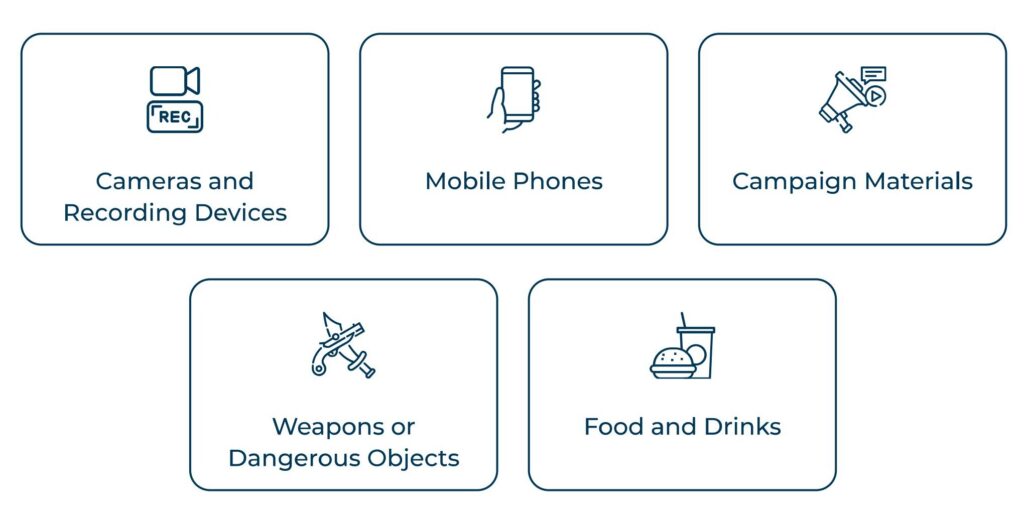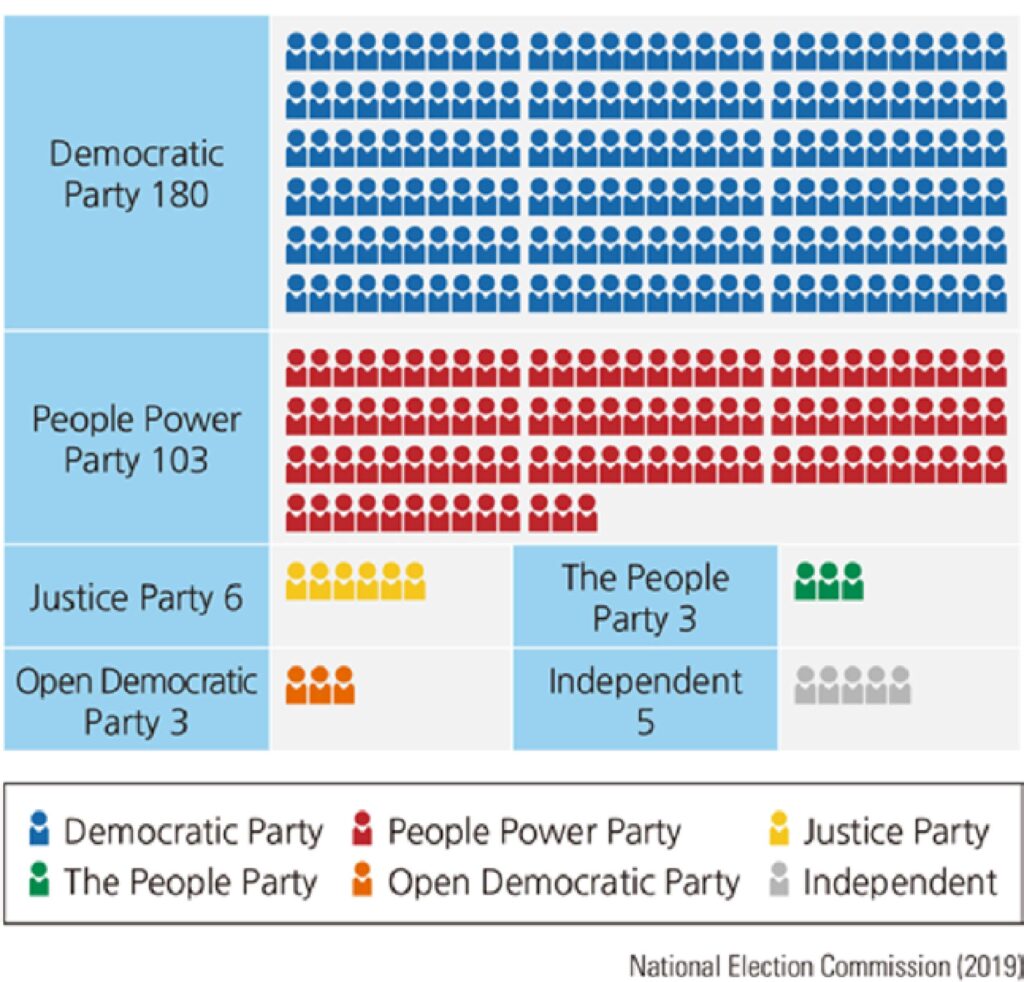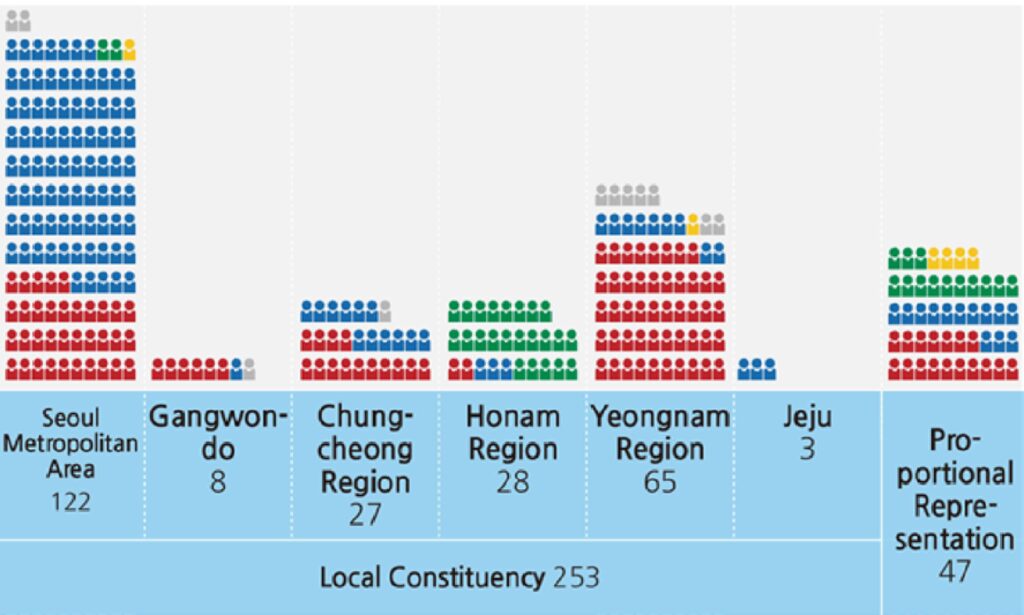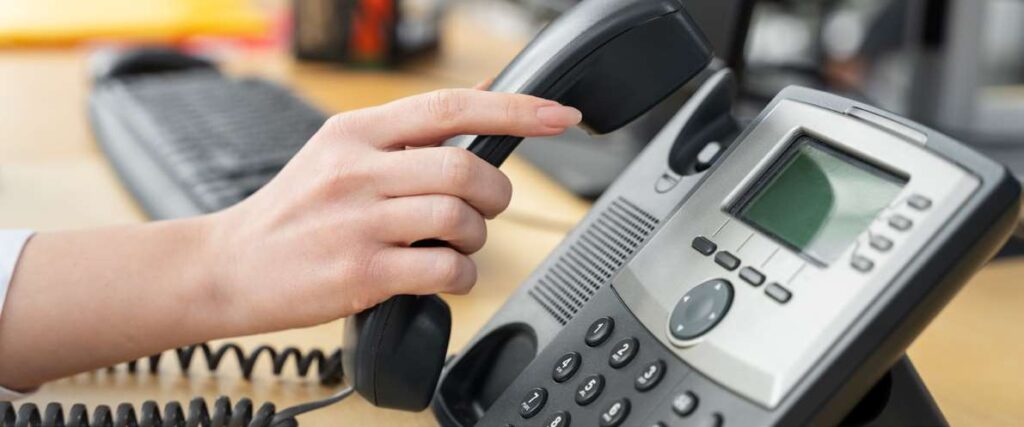South Korea will conduct its general elections to elect the 300-member 22nd National Assembly on 10 April 2024. As these elections come two years after Yoon Suk Yeol won the Presidential Election in March 2022, they are widely regarded as a referendum on President Yoon’s leadership and a vote of confidence in the opposition Democratic Party. For the past four years, the Democratic Party has maintained majority control in the Assembly, currently holding 180 seats. Amidst rising public discontent with President Yoon’s administration and gridlock within the Assembly, the electoral landscape is marked by intense partisanship. Consequently, the opposition’s party campaigning has focused on scrutinising President Yoon’s performance, with outcomes expected to impact the legislative agenda for the remainder of his term.
Extensive security measures are underway across the country, especially following the discovery of spy cameras at approximately 40 polling stations. Further, political protests are anticipated to disrupt business operations, particularly in major cities like Seoul and Busan. The escalating tensions between the Democratic Party and the President’s People Power Party (PPP) have resulted in instances of political violence, such as the recent stabbing of a prominent Democratic Party figure by a PPP supporter in Seoul. Additionally, recent actions by North Korea, including the suspected launch of an intermediate-range ballistic missile, have heightened security concerns in the region. Therefore, it is imperative for businesses to prioritise safety and security measures to safeguard their operations and personnel.
Important Information at a Glance
| Polling Date | 10 April 2024 |
| Timings | 0600-1800 hours |
| Results | by 11 April 2024 morning |
| Early voting | 05-06 April 2024 |
| Polling stations | 3,565 early voting polling stations and over 14,000 polling stations for elections on 10 April 2024 |
| Number of contesting candidates | 699 candidates from 21 parties for the directly elected seats, and 253 candidates from 38 parties for the proportional representation seats |
| Major participating parties and leader | 1.Democratic Party of Korea (DPK)- Lee Jae-myung 2. People Power Party (PPP)- Han Dong-hoon 3. Green-Justice Party (JP)- Kim Jun-woo 4. New Future Party- Lee Nak-yon |
General Information about National Assembly
- Term of Office: Four years
- Type of Parliament: Unicameral
- Number of National Assembly Members: 300
- 253 Constituency Members
- Single member constituencies
- Election system- First-past-the-post
- 47 proportional Representation Members
- Single nationwide multi-member proportional constituency
- Election system- Party-list proportional representation
- 253 Constituency Members
- Voter Eligibility:
- Korean citizens aged 18 years or older
- Residents registered in the relevant district for three months or longer (constituency member elections only)
- Each voter will cast two ballots: one for a district representative and one for a political party
Prohibited Items in Polling Stations

Members of the National Assembly by Party

Members of the National Assembly by Local Constituency and Proportional Representation

Key Concerns
- Economy: High cost of living and food inflation, Rapidly ageing population, Corruption.
- Civil unrest: Prolonged doctors’ nationwide strike, Bus union strike.
- Political: Disapproval of President Yoon’s performance mainly concerning economy, Distrust of the opposition Democratic Party with its leader, Lee Jae-myung, standing trial on bribery and other criminal charges.
- Security: Growing nuclear and missile threat from North Korea.
Security Measures
- Political party leaders began official campaign activities on 28 March, with restrictions on the use of loudspeakers. Campaigning is limited to open spaces from 0700 to 2100 hours, including public squares, parks, and streets.
- Non-Korean citizens, individuals under 18 years, those without voting rights, public officials, and employees of government-owned companies with 50 percent or more shares are prohibited from participating in campaign and political activities.
- Additional police personnel have been deployed in sensitive areas such as major cities like Seoul, Busan, and Incheon, as well as regions with historical instances of electoral violence.
- Heightened security is implemented at polling stations to prevent any disturbances or untoward incidents during the voting process. These stations are typically located at public offices, schools, and community centres.
- Surveillance and monitoring of cyber activities are being conducted to prevent and respond to potential cyber threats targeting the electoral process. The National Election Commission has reported identifying 129 cases of political parties and other entities using AI-generated deepfake content between 29 January – 16 February 2024 in an attempt to influence the results of the 10 April election.
Recommendations
Organisations
- Develop comprehensive contingency plans to address potential disruptions to business operations due to protests over civil issues and against the President’s alleged mismanagement of the economy, particularly regarding high inflation in the country.
- Additionally, amid ongoing doctors’ strikes and demonstrations across major regions such as Seoul, Jeju, Gangwon, Ulsan, and Daejon, disruptions to the delivery of medical services may be exacerbated.
- Anticipate marches, rallies, and demonstrations at prominent venues like Yeouido Hangang Park in Seoul and around university campuses such as Seoul National University.
- Plan travel and supply chain operations ahead to account for potential traffic delays and disruptions due to heightened security measures nationwide, which could result in increased congestion at key intersections and transportation hubs.
- Provide transportation facilities to particularly female employees, to ensure their safety and accessibility to the workplace, especially in areas prone to demonstrations or traffic congestion.
- Prepare for possible unscheduled power outages by arranging adequate backup power sources to minimise operational disruptions.
- Enhance cybersecurity measures by conducting thorough checks of all systems, updating software, and implementing suitable security protocols to mitigate cyber threats during the election period.
- Stay informed about election-related developments, security measures, and potential disruptions by relying on credible sources of information.
- It is also advised to run a security check of all the physical facilities, flammable items, CCTVs, electronic appliances, and conduct fire safety audits.
- If operating near a polling booth, have an emergency exit plan in place. Ensure that exits are clear and visibly marked for all and undertake simulations involving all employees.
- Conduct training sessions or drills to educate employees on security protocols and emergency procedures in case of civil unrest or other security threats.
Individuals
- Exercise caution when travelling in areas prone to protests and avoid unnecessary confrontations.
- Be vigilant and report any suspicious activities or security threats to local authorities or security personnel.
- Advised to not spread or react to rumours. Rely on official or credible sources of information.
- Elaborate security checks at airports may lead to congestion and operational delays. Commuters are advised to reach airports well in advance (three hours in advance for inbound flights and four hours for international flights).
- Follow safety guidelines provided by authorities or employers, including instructions on emergency procedures and security protocols.
- Given that authorities tend to strengthen security checks during elections, it is advised to carry proper identity proofs when stepping outside. If availing private or personal vehicles, carry essential vehicle documents as well.
- Advised to carry a portable charger when going out and ensure that cellular phones are adequately charged and have enough balance for making calls.
- Keep emergency numbers handy, on speed-dial as well as in writing.
- MitKat advises to steer clear of protest sites and remain vigilant of situational updates. Popular protest sites include Gwanghwamun Square, Jongno, City Hall Plaza, Seoul City Hall Station, Seoul National University, Yonsei University, and Korea University and government buildings like the Blue House (the presidential residence) and the National Assembly.


Emergency Contact Details
- Police: 112
- Medical assistance: 1339
- Fire and Rescue: 119
- Cyber Terror Report: 118
- Electrical Faults: 123
- Foreign Traveller Hotline: 1330
- Traffic related updates can be availed via- https://www.spatic.go.kr/spatic/main/index.do or https://twitter.com/poltraffic02
- National Election Commission
- E-mail : necvote@nec.go.kr
- Phone : +82 (0)2 3294 8361


